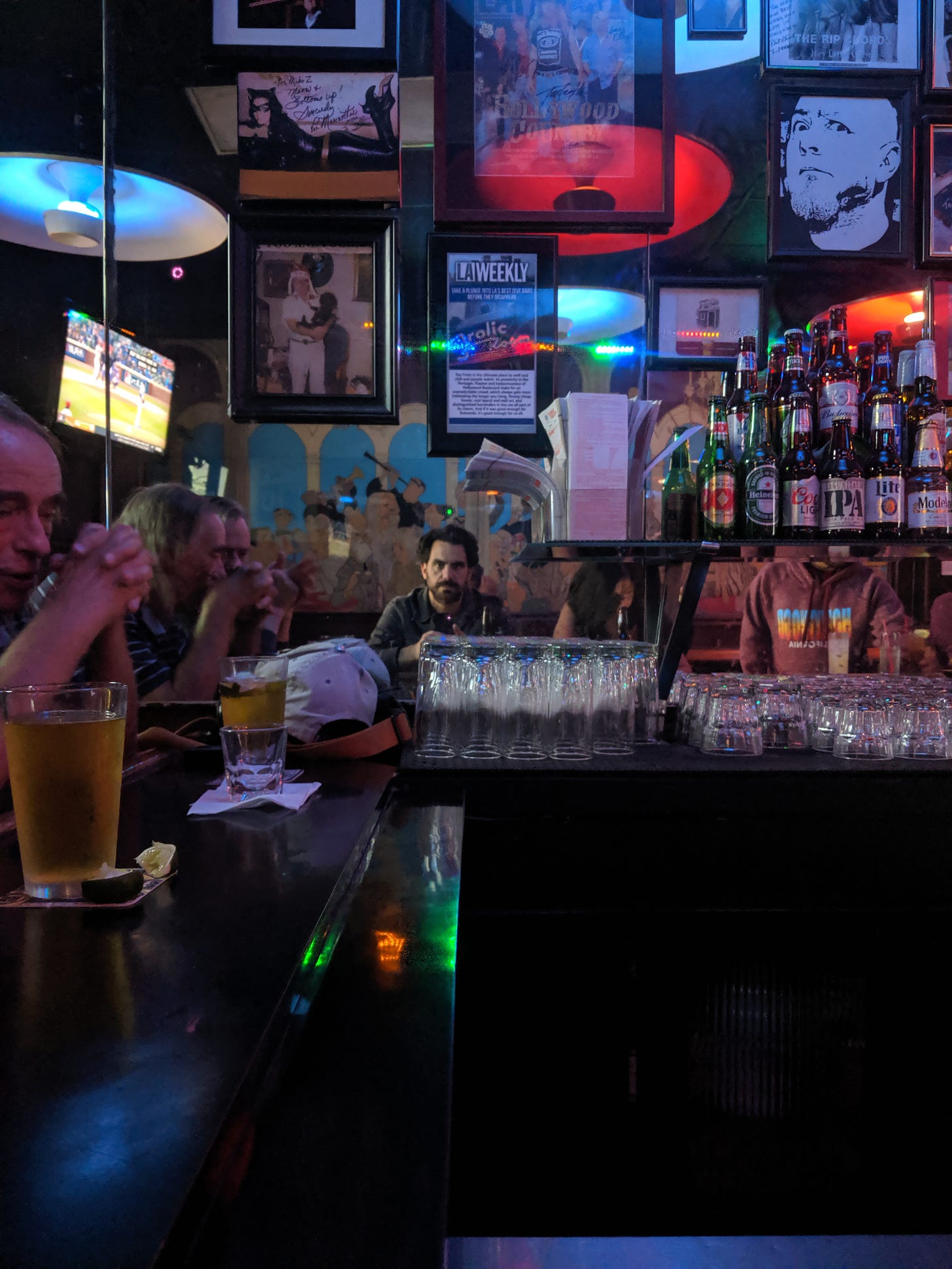Living The Semi-Retired Life: Why The American Dive Bar Matters
The only thing that’s constant is change and our need to figure out how to navigate it
I took this picture on May 21, 2019. At the Frolic Room, Hollywood’s oldest bar and one of America’s best, if not the best, dive bars. Little did I know that one year later we would be under a stay-at-home order and the guy sitting to my left would be dead.
I don’t know much about Reese. Other then he was a Frolic Room regular. Shortly after the pandemic started, he passed away. I’d be taking liberties with his story if I said he died of loneliness because he could no longer spend time at the Frolic Room. However, that was the sense I got when I texted with the guy who used to be the daytime bartender. That the isolation—and no longer having the Frolic Room as a place to congregate—killed him.
Today, a picture of Reese hangs at the end of the bar.
You can look at Reese’s image—or mine for that matter—and make judgments based on our facial expressions and body language. Based on the bottle of beer sitting in front of me or the spent lime and empty shot of, presumably, tequila adjacent to Reese. We all do this.
When you’re in a bar—particularly a dive bar—you might assume the guy who makes a noticeable entrance, telling stories and buying people drinks, has his shit together. That he has money and a life. You might also assume that the quiet, unassuming one staring into his beer has been sitting on that—or some other—bar stool for most of his life. That he spends most of the money he has on booze and has no life.
Cue a great line from Broadway, a song by the Goo Goo Dolls about a tough Polish-American neighborhood in Buffalo:
See the young man sittin' in the old man's bar
Waitin' for his turn to die
Sometimes these assumptions are true. Sometimes they’re horribly—maybe even dangerously—false.
I know this because I have spent a fair bit of time in dive bars. Hanging out in them alone and with friends. And, for a while, working in one. Today, you’ll find me—alone or with my girlfriend—at the Frolic Room a couple to a few times a month.
Prior to working in a dive bar, I made too many assumptions about people to count. And, more often than not, I was wrong. It wasn’t until I struck up conversations, asked questions and talked to people who actually, personally know dive bar patrons—regulars or otherwise—that I truly learned about the diverse groups of people who frequent America’s dive bars.
While some absolutely followed something like the young man sittin’ in the old man’s bar waitin’ for his turn to die trajectory, many have colorful, if not interesting histories full of cool—and sometimes incredible—professional and personal experiences.
Amaro authorityBrad Thomas Parsons writes a great Substack—Last Call—where he regularly asks bartenders, writers, chefs, musicians, and a host of dynamic people the question: If we were hanging out together at a bar and I put ten credits on the jukebox, what songs would you punch in and why? Brad’s work helps capture the sense of place and community dive bars create from his perspective as a someone who covers and chronicles drinking culture.
I approach the role of the dive bar from my perspective, as someone who focuses on not only the financial, but social components of retirement—or Never Retiring.
For the last 25 years or so, I have had a strong interest in public social life and sense of community.
It prompted me to move to San Francisco in 1999 and, within a couple of years, major in urban studies when, at age 27, I decided to go to college. It guided the things I studied during my roughly seven years of college. It triggered my interest in coffee shops, cafes and bars as primary gathering places, especially in cities. It factored into my decision to pull back on my writing and spend several years working in bars. It’s part of what guides my decision to leave America for Southern Europe with my partner in the next few years.
Before I ever set foot on Italian or Spanish soil, I knew the culture better aligned with what I want out of the place where I live and, as it ends up, will live out relative old age.



